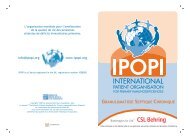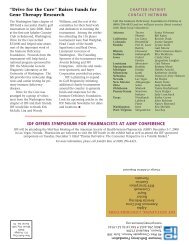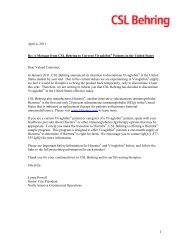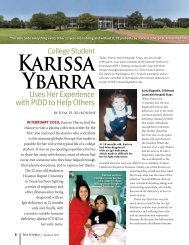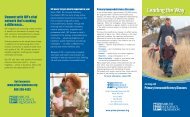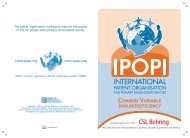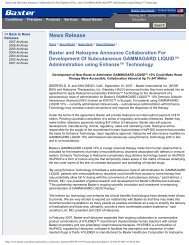IDF Patient & Family Handbook for Primary Immunodeficiency ... - IDFA
IDF Patient & Family Handbook for Primary Immunodeficiency ... - IDFA
IDF Patient & Family Handbook for Primary Immunodeficiency ... - IDFA
Create successful ePaper yourself
Turn your PDF publications into a flip-book with our unique Google optimized e-Paper software.
114 Adolescents with <strong>Primary</strong> <strong>Immunodeficiency</strong> Diseases<br />
Your <strong>Family</strong> continued<br />
to the skills and needs of each person on the<br />
team. With younger adolescents, parents may<br />
play a greater role in helping them discover<br />
these activities and interests, and negotiate their<br />
participation. As adolescents grow older, parents<br />
can put more emphasis on them exploring<br />
their interests, making contact with others, and<br />
developing their place in groups and on teams.<br />
Feeling like they belong and are successful may<br />
be very challenging when an adolescent has a<br />
primary immunodeficiency disease. Not everyone<br />
will be understanding or helpful in supporting<br />
your adolescent in finding his or her strengths<br />
and social supports. Be prepared to help them<br />
deal with the ups and downs of their successes<br />
and disappointments. While most relationships<br />
in adolescents may not carry through a lifetime,<br />
the skills and experiences in relationships during<br />
adolescence will shape how that adolescent<br />
relates to others as an adult.<br />
Share your experience of having a family<br />
member with a primary immunodeficiency<br />
disease with others—at the right time and<br />
with the right people.<br />
This may be limited to immediate family and<br />
friends, or it may include sharing with other<br />
families in the same situation through a support<br />
network. For some adolescents, it may include<br />
broader and more public sharing, such as giving<br />
a primary immunodeficiency disease presentation<br />
in a health class, doing a science fair or project<br />
in competition. Sharing can break the social<br />
isolation, improve supportive relationships, and<br />
give the adolescent a way to show their strengths<br />
and successes in dealing with a condition that<br />
can be very challenging. However, not everyone in<br />
your adolescent’s life will have a positive reaction.<br />
As with almost any kind of difference that can<br />
be noticed between people, the differences<br />
caused by a primary immunodeficiency disease<br />
can sometimes make the adolescent a target<br />
<strong>for</strong> teasing and isolation. Guide your adolescent<br />
in regards to the appropriate people, times and<br />
places to relay personal situations.<br />
Your Adolescent<br />
The adolescent years have many dramatic<br />
changes: bodies that grow from child to adult,<br />
responsibilities that shift from the role of the<br />
parents to the role of maturing adolescent,<br />
childhood friendships that trans<strong>for</strong>m into young<br />
adult relationships and schoolwork that takes on<br />
new meaning as the adolescent moves towards<br />
college and career. Each of these changes<br />
can be impacted by the adolescent’s primary<br />
immunodeficiency disease. Parents, healthcare<br />
providers, and other concerned adults in the<br />
adolescent’s life need to help cultivate open and<br />
supportive communication about these issues.<br />
These adolescents may still have a lot to learn<br />
about growing up, but they also deserve to be<br />
respectfully heard as they share their thoughts<br />
and feelings that come from the wealth of their<br />
experience dealing with day-to-day issues. One<br />
of the best ways to show this respect is to lead<br />
off any discussion by asking about their feelings,<br />
views, and experiences first. This approach<br />
helps to establish a respectful discussion in both<br />
directions, and there will be times when you learn<br />
that the adolescent’s viewpoint and concerns,<br />
while said a little differently, may be very close<br />
to the concerns that you, as a concerned adult,<br />
may be having.<br />
Here are some common questions that may<br />
be helpful in starting a conversation with<br />
your adolescent:<br />
So, am I sick or am I well?<br />
Have a discussion about the balance needed to<br />
cope with a primary immunodeficiency disease.<br />
Your adolescent’s healthcare providers may be<br />
helpful in advising on how to focus energies on<br />
both managing the disease and living life more<br />
fully. Help your adolescent identify enjoyable<br />
interests and activities that may be less impacted<br />
by days when the adolescent is not feeling well.<br />
Music, arts, crafts, and other creative activities can<br />
be enjoyed alone and with groups. These creative<br />
outlets also can provide needed distraction and<br />
relaxation when an adolescent is experiencing<br />
health challenges.








